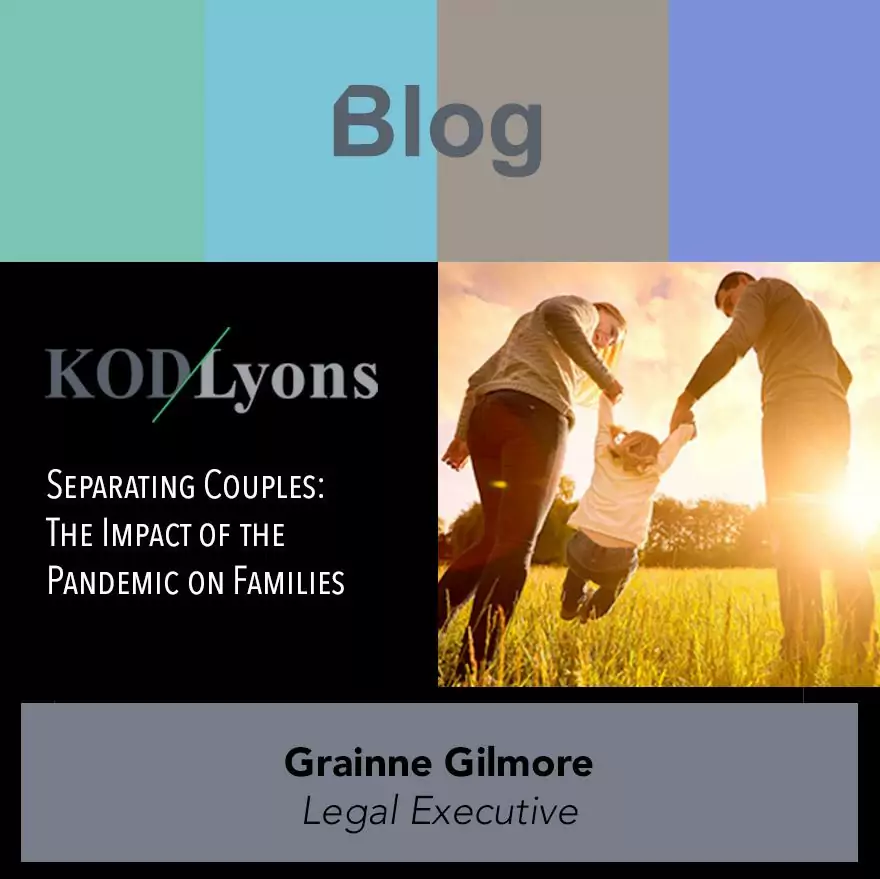The mandated lockdowns enforced due to the ongoing Covid-19 pandemic have had a drastic impact on many familial relationships, and we have seen a significant rise in separations, resulting in separation agreements, judicial separation and divorce applications. Existing issues and fault lines with relationships that were overlooked by couples during their busy pre-lockdown lifestyles have been brought to the forefront as they spend increased amounts of time together while living and working from home. With little space and virtually no privacy, it is not surprising that tensions have heightened between couples and led to the end of many relationships during the lockdown period.
The process of separating has become exceedingly difficult for people during this unprecedented time. Applications to formalise their separations are taking many months longer to conclude due to the constraints of the courts. Many couples and families remain living under the same roof throughout the process, and with less outside support from family and friends available to them due to social distancing measures, the feeling of isolation and frustration can fester. As a result of the difficult living arrangements there has been an upsurge in applications for safety and barring orders. Family issues that were previously complicated have been exacerbated by lockdown living arrangements and the prolonged closure of the courts.
The difficult family environments have led to the increased necessity for therapeutic intervention by specialist assessors, who carry out section 32 and 47 reports to help Judges to make informed decisions on the best interests of the children involved. As children learn to adapt to remote schooling, they may also have parents who have issued divorce or judicial separation proceedings against each other while continuing to share a home. More frequently, courts are calling in a psychologist or family therapist to help decide matters. While these reports benefit the parties and the courts by making recommendations that prioritise the best interests of the children, they also lengthen proceedings in order to allow sufficient time for the report to be completed. The court appointed assessors of these reports are currently near capacity with the volume of work, and may not be in a position to begin the process of a section 32 or 47 report for a number months from when they are engaged.
Unfortunately, for those in the process of divorce or judicial separation proceedings or those who have sought to apply for these applications over the past year, the courts have been significantly delayed. The delays in having the matters heard before a court, so that a Judge can give a direction to parties who are so entrenched, has led to the escalation of the situation in some cases, if the parties struggle to come to amicable agreements in relation to their finances and child custody arrangements. However, the pandemic has not led to a complete standstill in divorce and Judicial Separation cases. Negotiations between both parties and their solicitors continue remotely and settlement talks can be arranged via video call. Agreed settlement terms can be ruled quickly in the current situation and this provides for significant relief for parties who are desperately seeking finality to their matters. In some cases, the closure of the courts may have encouraged a constructive approach to resolving matrimonial differences.
As we gradually emerge from Level 5 restrictions, the Presidents of both the High Court and the District Court have made progressive announcements in relation to the reintroduction of normal court operation.
The President of the High Court, Mary Irvine, has included Family Law proceedings in the category of matters that should not be dealt with remotely as they are deemed to consider issues which are sufficiently sensitive enough to warrant an oral hearing.[1] In order to distribute the capacity within the courts, the High Court have decided that two Family Law courts will be sitting in order to hear non-urgent matters such as divorce hearings.[2]
Family law matters listed before the District Court will proceed at the times allocated on the court summons. The President of the District Court, Paul Kelly, has advised parties to attend court on their own if possible.
From the 7th of May, the public counter of the Family Law Circuit Court located in Phoenix House, Phoenix Street North, Smithfield Dublin 7 has reopened from 9.30am to 3.30pm Monday to Friday. Non-urgent family law cases have also begun to be rescheduled, and divorce and judicial separation hearings will resume being listed. The courts must work through the backlog of cases which has been brought about because of the pandemic and the court’s temporary closure, but they can once again begin providing judicial relief to those who are in need of it.
By Grainne Gilmore – Legal Executive
If you’d like more information then please contact Matthew de Courcy, Partner, and our Child and Family Law team.
Get in touch
Leaders in our field and winners at the Irish Law awards we have proven expertise in immigration and international law, child and family law and personal injury litigation.
Tel: +353 1 679 0780
Email: info@kodlyons.ie








